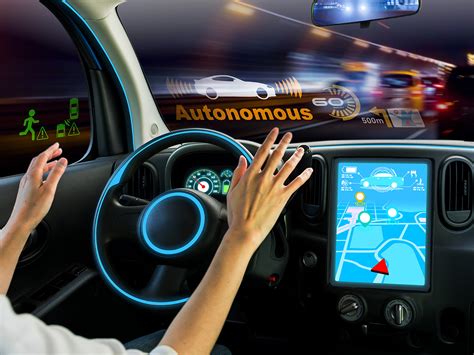The Future of Autonomous Vehicles Technology

Discover the latest autonomous vehicle technology trends, challenges, and societal impacts. Learn about the current state and regulatory framework.Autonomous vehicles have been a topic of great interest and technological advancement in recent years. From self-driving cars to automated delivery drones, the potential applications of autonomous vehicle technology are vast and promising. In this blog post, we will explore the current state of autonomous vehicles, the challenges and innovations driving their development, the regulatory framework surrounding their deployment, and the potential impact of these vehicles on society.
The current state of autonomous vehicles presents an exciting and rapidly evolving landscape, with major players in the automotive and technology industries investing heavily in research and development. However, with this rapid advancement comes a range of challenges, from technical hurdles to ethical and legal considerations. Yet, advancements in innovation continue to drive progress in creating safer, more efficient, and more accessible autonomous vehicles. Additionally, the evolving regulatory framework for autonomous vehicles plays a crucial role in shaping the future of this technology and its integration into our daily lives. Finally, we will consider the potential impact of autonomous vehicles on society, from changes in urban planning and transportation to potential job displacement and environmental implications. Join us as we delve into the fascinating world of autonomous vehicles and explore the opportunities and challenges that lie ahead.
Current State of Autonomous Vehicles
The current state of autonomous vehicles shows a promising future for the automotive industry. With advancements in artificial intelligence and sensor technologies, companies are making significant progress in developing self-driving vehicles that are capable of operating without human intervention. Major players in the industry such as Tesla, Google, Uber, and Waymo have been investing heavily in autonomous technology and have already deployed experimental self-driving cars in certain cities.
Despite the progress, there are still some challenges that need to be addressed before autonomous vehicles can become mainstream. Issues such as regulatory hurdles, safety concerns, and public acceptance are some of the factors that are currently hindering the widespread adoption of self-driving cars. However, with continued research and development, it is only a matter of time before these challenges are overcome.
Overall, the current state of autonomous vehicles is one of great potential and rapid advancement. As technology continues to evolve, we can expect to see more self-driving cars on the roads in the near future, transforming the way we commute and revolutionizing the transportation industry.
Challenges in Autonomous Vehicles Development
One of the major challenges in the development of autonomous vehicles is ensuring safety and reliability. Autonomous vehicles must be able to accurately detect and respond to various unpredictable situations on the road, such as sudden obstacles or unexpected changes in traffic conditions. This requires advanced sensor technology and complex algorithms to analyze and interpret data in real-time, which can be a difficult task to achieve.
Another challenge is the need for extensive testing and validation. Autonomous vehicles must undergo rigorous testing in a wide range of environments and scenarios to ensure they are capable of safely navigating different road conditions. This process can be time-consuming and costly, as developers need to simulate countless driving situations and continuously improve the vehicle’s performance.
Furthermore, there are significant challenges related to the regulatory and legal framework for autonomous vehicles. As this technology continues to advance, there is a need for clear and standardized regulations to govern the operation and deployment of autonomous vehicles. This includes issues such as liability in the event of accidents and ensuring that the vehicles comply with existing traffic laws.
Innovation in Autonomous Vehicles Technology
Innovation in Autonomous Vehicles Technology
The innovation in autonomous vehicles technology has been rapidly advancing in recent years, with major strides being made in areas such as artificial intelligence, sensors, and communication systems. These advancements have allowed for the development of vehicles that are capable of navigating without human intervention, leading to the potential for safer and more efficient transportation systems.
One of the key innovations in autonomous vehicles technology is the use of advanced artificial intelligence algorithms to interpret and respond to the environment. These algorithms can process large amounts of data from various sensors, enabling the vehicle to make real-time decisions about navigation, obstacle avoidance, and traffic management. Additionally, advancements in sensor technology, such as lidar and radar systems, have improved the ability of autonomous vehicles to accurately perceive their surroundings.
Another important innovation in autonomous vehicles technology is the development of communication systems that allow vehicles to interact with each other and with infrastructure. These systems, often referred to as vehicle-to-vehicle (V2V) and vehicle-to- infrastructure (V2I) communication, enable vehicles to share information about their locations, speeds, and intentions, facilitating coordinated movements and reducing the risk of collisions.
Regulatory Framework for Autonomous Vehicles
As the technology for autonomous vehicles continues to advance, there is a growing need for a comprehensive regulatory framework to govern their use on public roads. The development of regulations for autonomous vehicles is crucial to ensure the safety of passengers and other road users, as well as to address potential legal and ethical issues that may arise.
One of the main challenges in establishing a regulatory framework for autonomous vehicles is the need to balance innovation and safety. On one hand, it is important to encourage the development and deployment of autonomous vehicle technology to realize its potential benefits, such as reducing traffic accidents and congestion. On the other hand, there is a need to ensure that the technology is rigorously tested and meets strict safety standards before it is allowed to operate on public roads.
Another consideration in the regulatory framework for autonomous vehicles is the need for standardization and harmonization of regulations across different jurisdictions. With autonomous vehicles being developed and tested in various countries, it is essential to establish consistent regulations to avoid confusion and ensure interoperability of these vehicles on a global scale.
Impact of Autonomous Vehicles on Society
As technology continues to advance at a rapid pace, the development and deployment of autonomous vehicles are poised to have a significant impact on society. These self-driving vehicles have the potential to revolutionize the way we travel, work, and live. One of the key areas that will be affected by the widespread adoption of autonomous vehicles is the economy. The transportation industry, which currently relies heavily on human drivers, will undergo a major transformation as autonomous vehicles become more prevalent. This shift will likely lead to a reduction in the demand for traditional driving jobs, while also creating new opportunities in the tech and engineering sectors.
Furthermore, the introduction of autonomous vehicles has the potential to greatly improve road safety. With advanced sensors and sophisticated algorithms, self-driving cars are expected to drastically reduce the number of accidents caused by human error. This could lead to lower insurance premiums and decreased healthcare costs related to car crashes, ultimately benefiting society as a whole. Additionally, the widespread use of autonomous vehicles has the potential to reduce traffic congestion and improve overall transportation efficiency, leading to reduced carbon emissions and a healthier environment.
However, the impact of autonomous vehicles on society is not without its challenges. Concerns surrounding data privacy, cybersecurity, and the need for comprehensive regulatory frameworks are just a few of the issues that need to be addressed. Moreover, the potential displacement of traditional driving jobs and the ethical implications of self-driving technology are also important factors to consider. As autonomous vehicles continue to evolve and become more integrated into our daily lives, it will be crucial for society to adapt and address these challenges in order to fully realize the benefits of this innovative technology.





